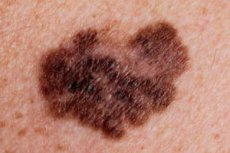New publications
Hereditary genes play a bigger role in melanoma risk than previously thought
Last reviewed: 02.07.2025

All iLive content is medically reviewed or fact checked to ensure as much factual accuracy as possible.
We have strict sourcing guidelines and only link to reputable media sites, academic research institutions and, whenever possible, medically peer reviewed studies. Note that the numbers in parentheses ([1], [2], etc.) are clickable links to these studies.
If you feel that any of our content is inaccurate, out-of-date, or otherwise questionable, please select it and press Ctrl + Enter.

When it comes to skin cancer, most people think of warnings about sunburn and tanning beds. Thoughts of "cancer genes" or inherited risks are more often associated with diseases like breast or colon cancer. New research challenges this status quo, showing that genetics play a bigger role in melanoma risk than is recognized.
Doctors rarely order genetic screenings to assess risk factors in patients with a family history of melanoma because limited previous research suggests that only 2% to 2.5% of all cases are genetic. For this same reason, insurance companies rarely cover these tests outside of the most extreme situations. In the medical field, genetic testing is not typically offered for cancers that do not meet the 5% threshold.
A study by a team of researchers and clinicians led by Joshua Arbesman, MD, of the Cleveland Clinic, and Pauline Funchin, MD, of Stanford Medicine (formerly of the Cleveland Clinic), suggests that melanoma more than meets that threshold. Their findings, published in the Journal of the American Academy of Dermatology, show that up to 15% (1 in 7) of patients diagnosed with melanoma by Cleveland Clinic doctors between 2017 and 2020 carried mutations in genes that predispose them to the cancer. The research team, which includes the Cleveland Clinic Center for Immunotherapy and Precision Oncology Institute, Ying Ni, PhD, and Claudia Marcela Diaz, PhD, analyzed international patient databases and found similar results.
"Hereditary cancers can wreak havoc on families and leave a trail of devastation. Genetic testing allows us to proactively identify, screen, and even treat these families, giving them the tools they need to get the best possible care," says Dr. Arbesman. "I would encourage doctors and insurance companies to expand their criteria for offering genetic testing to people with a family history of melanoma, because the hereditary predisposition to it is not as rare as we think."
Dr. Arbesman, who directs a lab at the Cleveland Clinic's Lerner Institute for Cancer Biology, also says his findings support a growing consensus among cancer biologists: There are risk factors other than sun exposure that can influence a person's likelihood of developing melanoma.
"Not all of my patients had inherited mutations that made them more vulnerable to the sun," he says. "There's clearly something else going on here, and more research is needed."
Dr. Arbesman and his team are studying many of the genes identified in his patients’ genetic tests to learn more about how melanoma develops and how it might be treated. For example, he’s working to determine whether some of his patients and their families who have inherited mutations might benefit more from immune therapy than those who don’t have inherited mutations. His lab is also working to determine how other patients’ genes contributed to the development and severity of their melanoma.
